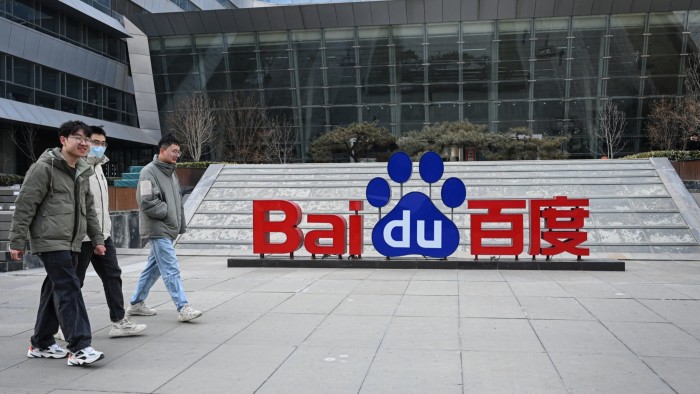Unlock the Editor’s Digest for free
Roula Khalaf, Editor of the FT, selects her favourite stories in this weekly newsletter.
Baidu has unveiled artificial intelligence-powered smart glasses as Chinese tech groups race with global rivals to capitalise on AI-integrated hardware.
Li Ying, head of Baidu’s hardware brand Xiaodu, said its smart glasses would “become a private assistant” during a Baidu event in Shanghai on Tuesday.
The glasses are run on Baidu’s large language model Ernie and will enable wearers to track calorie consumption, ask questions about their environment, play music and shoot videos, said the company.
While China is lagging behind the US in developing the most powerful large language models, experts have said Chinese tech groups could leverage the country’s sophisticated electronics sector to develop competitive consumer hardware integrated with AI. Baidu’s glasses will initially only be sold in China.
The company’s entry into smart glasses comes as US tech groups Meta and Snap are rushing to dominate the market outside China. Meta has teamed up with Ray-Ban on a series of smart glasses, with a pair selling for as much as $379. They are not available for sale in China.
The launch of Baidu’s smart glasses, which are expected to go on sale next year, signals the start of a battle among the country’s major internet groups to become the leading provider of AI-integrated hardware. Previously, smart glasses had been largely undertaken by start-ups.
Xiaodu has embedded Ernie Bot into existing products including a virtual dashboard for families to help monitor elderly relatives, who can talk to AI doctors and receive reminders to take medication through a device.
Last month, TikTok owner ByteDance launched its first pair of earbuds, which allow users to talk directly to the company’s Doubao chatbot without using their smartphone.
“The magic that Chinese technology companies have consistently displayed is coming up with compelling consumer products at competitive price points,” said Paul Triolo, partner and global tech policy lead at consultancy Albright Stonebridge Group. “This will give them an edge over foreign companies in integrating AI into useful applications at scale.”
Baidu, which operates China’s dominant search engine, was leading the race to develop the country’s version of OpenAI’s ChatGPT. Ernie Bot — whose mobile version was recently rebranded as Wenxiaoyan — has since been overtaken by ByteDance’s Doubao.
Doubao is now the leading chatbot in China as measured by monthly active users, according to market intelligence service Sensor Tower. It was the fifth-most downloaded AI app worldwide from January to August, behind ChatGPT and Google Gemini, said Sensor Tower.
Robin Li, Baidu’s co-founder and chief executive, also announced a new AI image generator iRAG on Tuesday. Li claimed that the image generator had fewer hallucinations as a result of retrieval-augmented generation (RAG), a technique for boosting the accuracy of responses with information fetched from outside sources.
“Over the past year, the biggest change in AI has been the elimination of hallucinations, using RAG to increase the reliability and accuracy of models,” said the Baidu chief executive.
While Tencent and Alibaba’s stocks have rallied this year, Baidu’s has fallen by 26 per cent since January after investors were underwhelmed by its AI offerings and concerned about falling advertising revenues. Baidu generates the bulk of its sales from advertising on its search engine.
Read the full article here

